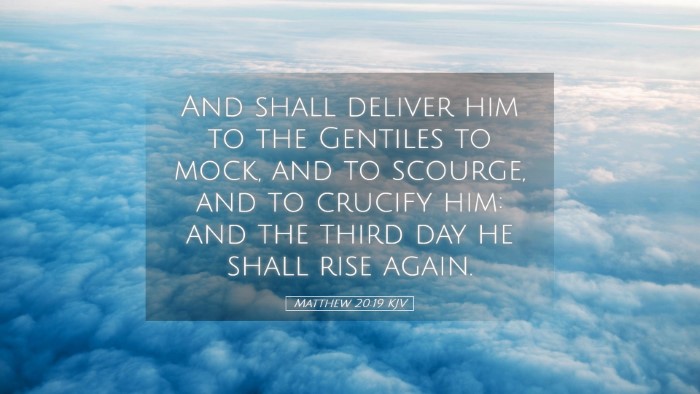Commentary on Matthew 20:19
Matthew 20:19 states: "And shall deliver him to the Gentiles to mock, and to scourge, and to crucify him: and the third day he shall rise again."
Contextual Analysis
This verse is embedded in a significant discourse where Jesus predicts His passion, showing His awareness of the suffering that lies ahead. The passage occurs during Jesus' journey to Jerusalem, where He prepares His disciples for the impending events of His betrayal and death.
-
Historical Context: Jesus' prediction marks a pivotal moment in the New Testament, drawing attention to the prophecies of the Old Testament and emphasizing the seriousness of His mission.
-
Theological Significance: This forewarning illustrates themes of sacrifice, redemption, and the power of resurrection, which are central to Christian faith.
Insights from Matthew Henry
Matthew Henry emphasizes the fulfillment of prophecy in this verse. He notes how Jesus' foretelling of His suffering serves not only as a revelation of His earthly mission but also as a comfort to believe in the assured hope of the resurrection. Henry explains:
"The passion of Christ was both a depth of sorrow and a height of glory, making manifest His love towards humanity."
Henry highlights that the mocking and scourging are emblematic of the contempt Jesus would face, which underscores the sacrificial nature of His mission.
Insights from Albert Barnes
Albert Barnes provides a detailed exposition on each component of the verse, particularly focusing on the phrase "deliver him to the Gentiles." Barnes describes this as:
"A reference to the Roman authorities who would carry out the execution, signifying not just the betrayal by His people, but also the encompassing rejection by the Gentiles."
Barnes also notes the significance of the resurrection on the third day, asserting that it symbolizes the triumph over death, a theological cornerstone of the Christian faith—a promise of eternal life for believers.
Insights from Adam Clarke
Adam Clarke focuses on the emotional and personal impact of this prediction. He notes that Jesus' knowledge of the suffering He would endure shows profound love and commitment to His mission. Clarke articulates:
"His willingness to endure such humiliation and pain reflects profound sovereign authority and a divine plan for salvation."
Clarke emphasizes that understanding this depth of suffering is essential for believers, as it fosters appreciation for the grace received through Christ's acts.
The Role of Suffering in Christian Life
Clarke also invites reflection on how believers may experience their own suffering:
-
Identification with Christ: Just as Jesus faced trials, Christians can find solace in knowing that their struggles serve a purpose.
-
Hope of Resurrection: The resurrection promise urges believers to view their sufferings through the lens of hope and eternal life.
Conclusion
In Matthew 20:19, the foretelling of Jesus' passion encapsulates the core of the Gospel message—the necessity of His suffering, the reality of His ultimate sacrifice, and the glorious promise of His resurrection.
The insights from Matthew Henry, Albert Barnes, and Adam Clarke collectively enhance the understanding of this pivotal verse. It encourages believers to embrace the truth of the Gospel while recognizing the gravity and significance of Jesus' passion.
For pastors, students, and theologians, this verse serves as a reminder of Christ's love and the call to bear one's own cross in the light of His suffering and the sure hope of eternal life.


